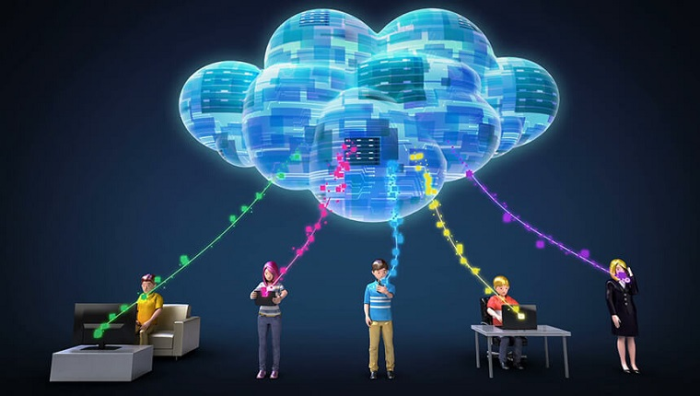Cloud computing and infrastructure building priorities for digital technology
In 2022, the world is still struggling with the COVID-19 pandemic and the use of digital technology in the online environment is gradually becoming familiar to serve activities in life.
Cloud computing and “emerging” technologies
This leads to a significant increase in the amount of digital data that needs to be processed. For example, in an online video streaming application (livestream) on e-commerce platforms, developers need to integrate the functions of video playback, online payment, interaction between sellers and customers over time. Therefore, cloud computing has been considered as the "backbone" technology for the development and improvement of user experiences in the network environment. According to Gartner research, global cloud service fees will increase from $314 billion to $482 billion by 2022.

At the same time, the emergence of new technologies such as Blockchain, IoT will certainly be a factor that promotes cloud computing to develop even more strongly. From a technical perspective, blockchain can solve security problems in the cloud computing environment that still exist. When using blockchain technology in the cloud, all transaction data will be stored and it is difficult to delete due to the consensus mechanism that is characteristic of this technology. Accordingly, all actions conducted in the cloud are recorded. So it takes less time for a cloud service provider to detect attacks and to comply with data protection regulations within 72 hours. Meanwhile, cloud computing can solve the limitations of IoT devices by providing extensive data processing and storage resources. More,
Thanks to these features and benefits, cloud computing is increasingly asserting its role as an important digital infrastructure, the best foundation for today's outstanding digital technologies such as the metaverse, cloud gaming, etc. like Epic Games' Fortnite meta-game has 500 million users and nearly all of its work is in Amazon's cloud. Similarly, the development of the metaverse cannot be separated from the accumulation of basic technologies in the real world. Metaverse's "immersive", "low-latency" and "universal" features not only place high demands on VR/AR hardware technology and network delivery systems, but also rely on electrical capabilities high performance cloud computing and online communication technology.
The road "to the clouds" is not smooth
Returning to the Vietnamese market, although the cloud computing market is still in a positive development stage, many policies have been and are promoting the use of the cloud, however, there are still some objective factors affecting the use of the cloud. affects its development speed, focusing on two main groups: infrastructure and digital skills of users. Currently, the quality of digital infrastructure in Vietnam has not been developed synchronously to be able to operate the cloud smoothly; Data security issues in our country still have many shortcomings. Regarding the quality of human resources, according to the Digital Transformation Index 2020, the people's digital skills assessment score is still quite low, only about 0.23/1.0, especially with a significant difference in points. between the top and bottom provinces, respectively 0.47/1.0 and 0.0283/1. 0. This shows that the level of human readiness to receive and use new technologies such as cloud computing in Vietnam is still not really similar to the potential that this technology brings. In addition, there are still some businesses and customers who do not really trust the services of cloud computing providers as well as worry about the high cost of use and investment compared to the size of the company. or usage needs.
In addition to these objective factors, a number of limitations stem from the internal factors of domestic service providers that prevent these enterprises from competing with foreign cloud computing service companies. According to the overall assessment of the competitiveness of cloud computing service providers in the draft Information and Communication Infrastructure Master Plan for the period 2021 - 2030, with a vision to 2050 of the Ministry of Information and Communications. In addition, in addition to the criterion of price competitiveness of domestic suppliers, there is an advantage over foreign suppliers, other criteria such as brand, product ecosystem, sales capacity, quality Service quality, technology capacity of domestic suppliers are similar or disadvantageous compared to foreign suppliers. Specifically, about the brand, Only the top 5 domestic suppliers invest in brands, while foreign suppliers often have a wide brand coverage around the world. The product ecosystem of domestic enterprises is still limited with only about 40 products compared to 150 products of foreign suppliers.
Preparing for the 'cloud' transition?
In the above context, in order to take advantage of the potential of this technology, the policies and legal regulations governing digital infrastructure, encouraging and promoting the use of cloud computing need to be completed quickly to promote promote and improve the efficiency and competitiveness of enterprises in the Vietnamese market. Even in the public sector, agencies also need to actively use cloud computing as a platform for governance, storage, data mining, digitization of public sector operations, and infrastructure improvement. Then, the private sector will have more incentive to use the cloud thanks to the compatibility and security of the infrastructure. In addition, the institution of “data officer” should also be regulated in both the public and private sectors. This will be the focal point responsible for the overall architecture of the data system as well as the entire management, exploitation,
From a technical perspective, agencies and organizations should invest in research and flexibly combine cloud models (private cloud, public cloud, hybrid cloud), or between multi-cloud computing. to increase the cost-effectiveness of use in accordance with the needs and purposes of the organization. At the same time, training and digital capacity enhancement activities also need to be focused so that each individual in the organization can exploit and take advantage of the power of this technology.
Operate and exploit advertising by iCOMM Vietnam Media and Technology Joint Stock Company.
116 Thai Ha, Trung Liet Ward, Dong Da District, Hanoi.
Email: info@more.edu.vn
Editor in chief: Tran Vo
Tel: (+84) 903076053/7 Fax: (+84) 903030935